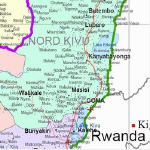King report (mp3) - Download 595k
Sporadic clashes erupted on Monday in three locations, persisting in Ngungu locale on Tuesday. The clashes pose a threat to a U.N.-brokered ceasefire which has held for three weeks. U.N. spokesman Gabriel de Brosses says the U.N. is monitoring the situation closely and has troops in the region. "We made air reconnaissance over the areas that were at stake yesterday. Basically, I think the ceasefire is still effective," he said. De Brosses says forces loyal to former General Laurent Nkunda, are responsible for Monday's eruption of violence. A spokesman for Nkunda on Monday accused the Congolese armed forces, known as the FRDC, of attacking first. De Brosses dismissed that claim. "For the moment, the FRDC troops don't have any reason for attacking anyone," he said. The U.N. said there were no reports yet on casualties during the fighting. De Brosses told VOA that Nkunda's forces also clashed with Hutu militias in the region, in a separate incident on Monday. Nkunda claims he is trying to protect eastern Congo 's ethnic Tutsi population from attacks by Hutu militias, who have ties to the perpetrators of neighboring Rwanda 's 1994 genocide. The Congolese government calls Nkunda a renegade, and has urged him to integrate his forces into the regular army. Congo's President Joseph Kabila said last week that he will not negotiate with Nkunda at this time. Fighting erupted in the region after Nkunda's forces attacked government positions in late August. Eastern Congo has long been a cauldron of simmering tensions as militias, often allied along ethnic lines, fought for control of territory in the resource-rich region. The UN and aid groups note that women and children bear the brunt of the fighting. Rape and recruitment of children into armed groups are endemic in the area. A 1998-2003 war in eastern Congo embroiled the region, pulling in seven neighboring nations and costing an estimated 4 million lives, mostly from hunger and disease. In recent weeks the U.N. has said it fears a deepening humanitarian crisis, and estimates some 300,000 people have fled their homes in the region this year.![]()
Listen to King report (mp3)
![]()

Related articles
- • Felix Tshisekedi Sworn In as DR Congo President (January 24, 2019)
- • Constitutional Court Declares Tshisekedi Winner of Presidential Election (January 19, 2019)
- • Felix Tshisekedi Vows to Be the President of All Congolese (January 10, 2019)
- • Felix Tshisekedi Elected DR Congo President (January 10, 2019)
- • DR Congo Delays Results of December Election (January 6, 2019)
- • Botswana Urges Joseph Kabila to Step Down (February 26, 2018)
- • No elections in DR Congo in December without electronic voting machines: INEC (February 13, 2018)
- • US Warns DR Congo Against Electronic Voting for Delayed Election (February 12, 2018)
- • Felix Tshisekedi accuses INEC of illegally prolonging Kabila's mandate (October 24, 2017)
- • DRC Seeks Arrest of Presidential Candidate Moise Katumbi (May 19, 2016)
- • Papa Wemba Is Buried in Kinshasa (May 4, 2016)
- • Papa Wemba Awarded Highest National Honor as Thousands Pay Tribute (May 2, 2016)
- • Rights Groups: DR Congo Must Free Pro-democracy Activists (April 13, 2015)
- • Police Open Fire on Crowd Protesting Election Law Change (January 19, 2015)
- • Etienne Tshisekedi Evacuated to Belgium for Medical Treatment (August 16, 2014)
- • Kerry Calls on Kabila to Honor Constitution (May 4, 2014)
- • Kerry in DR Congo for Security Talks (May 3, 2014)
- • DR Congo Takes Chairmanship of COMESA at Summit in Kinshasa (February 26, 2014)
- • DR Congo Honors Nelson Mandela, Hero and Model for Humanity (December 6, 2013)
- • Kabila Congratulates Congo Army for Defeating M23 Rebels (October 30, 2013)
- • DR Congo Asks Rwanda to Turn Over M23 Rebel Leaders (July 26, 2013)
- • DR Congo Eases Process for Starting a New Business (June 3, 2013)
- • Regional Leaders Sign DR Congo Peace Deal (February 24, 2013)
- • The M23 Rebels Want to Overthrow Kabila? Nonsense (November 28, 2012)
- • Protests Against M23 Rebels, Government and UN Spread (November 22, 2012)
- • Thousands Protest M23 Capture of Goma, Turn on Government and UN (November 21, 2012)
- • DR Congo Officials Vow to Defend Goma Against M23 Rebels (November 19, 2012)
- • At high-level meeting, Ban urges political solution to crisis in eastern DR Congo (September 27, 2012)
- • US Cuts Military Aid to Rwanda Over Support to Rebels in DR Congo (July 21, 2012)
- • DR Congo, Rwanda Sign Pact to Fight Rebels in Eastern Congo (July 15, 2012)







